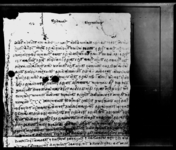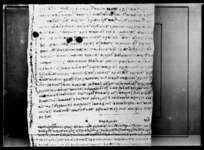A deed of emancipation written by Rājakumāri Pãḍenī for her slaves Indravadan and Ujīra Khavāsa (VS 1943)
ID: K_0118_0032
Edited and
translated by Manik Bajracharya
in collaboration with
Bal Gopal Shrestha
Created: 2016-12-19;
Last modified: 2018-06-21
For the metadata of the document, click here
The accompanying edition, translation/synopsis and/or commentary are available under the terms of the Creative Commons Attribution-ShareAlike 4.0 International License
Abstract
This is a document drawn up by Rājakumārī Pā̃ḍenī and delivered to two slaves, Indravadan and Ujīra Khavāsa, wherein she frees them on condition that they serve her throughout the remainder of her life.Diplomatic edition
[1r-part1]
1श्री\1श्रीगुजेकाली2१1श्रीपसुपतीनाथ
2२1रुजुसहिShamirShumshere1⟪१८०⟫1⟪११नं.⟫1सकलवमोजींनकलदुरुस्तभनीसहीछापगर्नेउजीरेघर्ती ¯¯1श्रीकृष्णचरणराजकुमारीसरणभंन्येछापतेस्कातललापच्येसहीमसीनमीलेकोस्हीछापरूजुनहुदाप्रेमवाहादुरभंन्येलेषेको1लिषितंनरदेवीटोलवस्न्याकजेनीराजकुमारीपडेनिछेत्र्यानीकस्येदाइजोकेटीइन्द्रवंदन्निजकोछो
2रोउजीरेकेटोहरूस्मेत्केहजुरकोहामीहरूलेअघीदेषीआजस्मरूजुरहीचाकरीगरीआयाका
3⟪छौ⟫अवहामीहरूलाईपारपत्रगरिवक्स्याहजुरकोसरिर्षडाछन्ज्यालस्मआठौप्रहररुजुरही
4टहलचाकरीगरिहजुरकै•सोझोचिताईहजुरकाटहलचाकरीगरौलाटहलचाकरीगर्दा
5साहेवकोसरिर्कोसरदाभक्तीधर्मथामीटहलगरौलारूपैय़ापैसानगदजीन्सीकौनैको
6कुरामाहामीहरूलेसाहेवमाथीकुभलोचीताञौभनेहाम्रोकैलेभलोनहव़स्लोभानीपापा
7नीगरिहजुरमाथीकुभलोची[?]अपराधगरेउरहजुर्कोअधर्मचीताईअनेत्रछाडीजाने
8छैनौहजुरकासेषपछीहामीलाईहजुरवाटगरीवक्स्याकापारपत्रवमोजींआफ्नुआफ्नु
9षुसगरौलाय़ोपत्रमालेषीय़ाकावेहोराकावंदेजमानरहीहजुरकासरीर्षडाछदैअने
10त्रगञ्यूभनेरपापनासगैलोग्न्याअरूकसैकाकरासुनिलेषीय़ाकावन्देजमानरहीअने
11त्रगञ्यूभने ¯१¯र¯२¯देवतारपंचभलाआद्मीसाछीराषीरीतपुर्याइअंलेषगराईहामी
12लाईपारपत्रगरीवक्स्याकोछतापनिहामीलाईचाकरतुल्याईहजुरकोषुसगर्नुपारपत्रग
13रीदीय़ाकोमाहाम्रोउजुरलाग्नेहोतापनीहाम्रोवेउजुरउजुरगर्नेछैनौउजुरनास्तीउजुरग
14र्यौंभनेसोलीषत्झुट्टागरीदीनुहजुरकासेषपछीमात्रसोकवुलपत्रछतापनीहजुरकादर
15संतानहकव़ालादैय़ादारअरूकसैकोटहलचाकरीगर्नेछैनौय़हीपत्रवमोजींआफ्नुआफ्
16नुषुसगरीवस्नुवसौलाय़सपत्रमालेषीय़ावमोजींगर्नुभनीमेरामनोमानषुसीराजीसंगपार
17पत्रकोनामापत्रलेषीनीजहरूदाइजोइन्द्रवदंनीजकोछोरोउजीरषव़ासलाईदीञ्यूसाछीछो
18डोलवस्न्यालेफ्टेंभिम्वलकव़र१असन्वस्न्याहर्षनन्दगुभाजु१नैकंतलावस्न्याकप्तान्इन्द्रधोज
[1r-part2]
19पाडेकप्तान्विश्नुकुमारपाडेमेजरअजिटन्टेकवाहादुरपाडेठमेलवस्नेसुवेदारवलध्वजभ
20भडारीछेतृलेषकसाछीप्रय़ागदत्तपाध्याइतिसम्वत१९४३सालमीतीफाल्गुणवदी
21७/२शुभम्¯¯¯¯¯¯¯¯¯¯¯¯¯¯¯¯¯¯¯¯¯¯¯¯¯¯¯¯¯¯¯¯¯¯¯¯¯¯¯¯¯¯¯¯¯
Translation
[1r-part1]
Glorious Guhyakālī - 1
Glorious Paśupatinātha - 2
Attested, signature; Shamir Shumshere1
1802
No. 113
Signed by Ujīre Ghartī in attestation that the copy is identical with the original4
A fingerprint signature under a seal reading "The feet of glorious Kṛṣṇa [are] the refuge [of] Rājakumārī"; [and] since the (foregoing) signature, in a different ink (from the rest of the document), is unattested, [the name] Prema Bāhādura has been written.5
Written by Kajenī6 Rājakumārī Pãḍenī Chetryānī, resident of Naradevī Ṭola, to the female slave (keṭī) Indravadan and her son, the slave-boy (keṭo) Ujīre, [both acquired as] dowry.
"We have been attending and serving you from the past up until today. If now you provide us with a deed of emancipation (pārapatra), we will attend you throughout [all] eight praharas (i.e., around the clock) to take care of you with honest intent for the remainder of your life. While serving you, [our] mistress (sāhebako sarir, lit. mistress's body), we will do so by keeping alive [our] faithfulness, devotion and duty [to you]. Regarding money, valuables and property, if ever we intend you [our] mistress ill, may it never go well with us. We will not leave you and go elsewhere out of greed and sinfulness, having intended you ill, committed a crime, or intended something unlawful towards you. In accordance with the deed of emancipation granted by you, we will each act according to our wishes after your death. If, instead of remaining within [the terms of] agreement written in this deed, we go elsewhere while you are still alive, or if we, going [down] to sin and destruction from listening to [my] husband or anybody else, fail to remain within [the terms of] the agreement and go elsewhere, then—even if you have granted us the deed of emancipation, with the deities -1- (i.e., glorious Guhyakālī) and -2- (i.e., glorious Paśupatinātha) and five notables as witnesses—make us [your] slaves [again] and do [with us] as you wish. Since you have provided us with a deed of emancipation, we might mount a legal appeal (against re-enslavement). However, our [case] would admit of no appeal. We would not appeal; there is no appeal (we could mount). If we did file an appeal, please show that what is written in it is false. The agreement (kabulapatra) is [valid] only after your death. Nevertheless, we will not [afterwards] serve your descendants, rightful inheritors or anybody else. In accordance with this document, we will each live as we please."
I have written [this] deed of emancipation (pārapatrako nāmāpatra) willingly, having given instructions to act according to what is written in this document, and have handed it over to the aforementioned [persons acquired as] dowry, Indravadan and her son Ujīra Khavāsa.
Witnesses: Leutenant Bhīmbala Kavara, resident of Choḍola - 1, Harṣananda Gubhāju, resident of Asan - 1, Captain Indradhvaja Pāḍe, resident of Naikaṃtalā,
[1r-part2]
Captain Viṣṇukumāra Pāḍe, Major Adjutant Ṭeka Bāhādura Pāḍe, SubedāraBaladhvaja Bhaḍārī Chetrī, resident of Ṭhamela [and] the scribe [and] witness Prayāgadatta Pādhyā.The 2nd (i.e., Monday?) of the 7th of the dark fortnight of Phālguna in the [Vikrama] era year 1943 (1887 CE).
Commentary
This is one of two documents copied together in a collection belonging to the Garuḍanārāyaṇa Guṭhī. Both this and the other document, K_0118_0033, officialize the emancipation of slaves Indravadan and Ujīre by Rājakumārī Pãḍenī. In the left margin of the document, Ujīre Ghartī attests that the copy is identical with the original. It is not clear if this Ujīre Ghartī is the same Ujīre mentioned in the document. Both the documents, K_0118_0032 and K_0118_0033, are good examples of how the slaves were made to work for their masters even after their emancipation.
For documents regarding a legal case involving Rājakumārī Pãḍenī, see K_0175_0018, K_0118_0039 etc., K_0175_0032 and K_0175_0033, which are the receipts of an expiation fee paid by her, and K_0175_0034, which is a patiyā-pūrjī issued to her.


